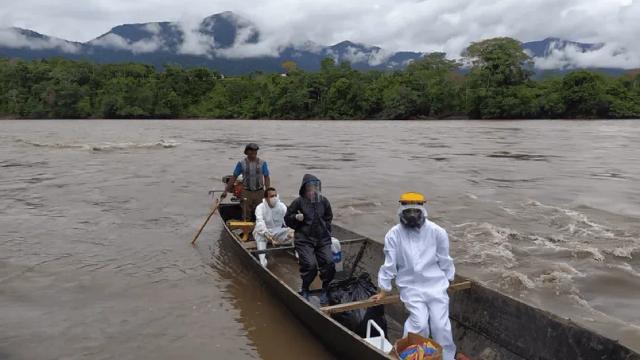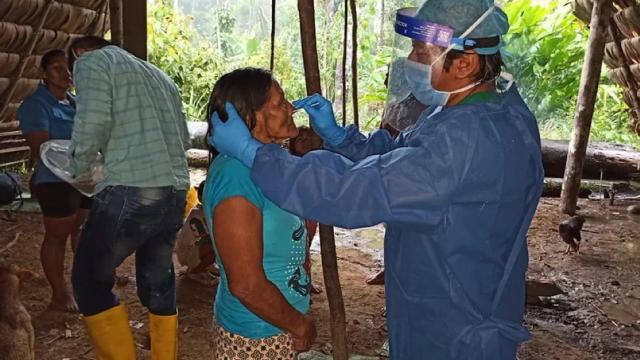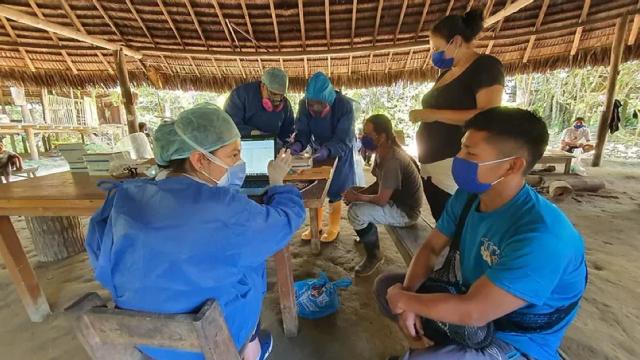Winners of SDSN Amazon and iAMA Award for Confronting COVID-19
The two projects, Amazon Communication and COVID-19 Alert Network of the San Francisco de Quito University (USFQ), and Achuar Indigenous Food Security in the Context of the Coronavirus Pandemic of the Pachamama Foundation, focus on facing the new coronavirus. They were selected by the Sustainable Development Solutions Network for the Amazon (SDSN Amazonia) and the Amigos da Amazônia Institute (iAMA) to receive financing of up to US $5,000 to minimize the impacts of the pandemic in the region.
The call was launched in June 2020 and offered financial support for member organizations of SDSN Amazonia. Twenty-one research, development, and innovation projects applied, with ten submissions from Brazil, eight from Ecuador, and three from Peru.
The two selected projects will confront COVID-19 in the Pan-Amazon, as the pandemic continues to advance; to date there have been more than 880,000 confirmed cases and 23,000 registered deaths, according to data from the Panamazonic Ecclesial Network (REPAM). The disease affects mainly indigenous and traditional populations, who are particularly vulnerable due to their isolation and access limited to medical care. Furthermore, prevention measures and data collection are not being implemented fast enough to reduce the rate of contamination.
Indigenous Communication
The Amazon Communication and COVID-19 Alert Network responds to the need for communication in the Ecuadorian Amazon, training members of indigenous communities to implement a short-wave radio alert system complimented with internet hubs powered by solar energy. Together, these tools allow the exchange of information between communities and other actors, such as the Ministry of Health and international organizations.
According to the project team, the project will disseminate critical information so that communities can make informed, autonomous decisions and responses. "Through this project, we aim to promote indigenous communities’ access to governance representation and social control within the communities, aiming to reduce inequalities and promote just, peaceful and inclusive societies," states the proposal presented by the USFQ.
The initiative will also record relevant data to better understand indigenous responses to the pandemic. The beneficiaries are communities in the Achuar, Shuar, and Quijos indigenous territories with limited connectivity and governance representation.
Food Safety
Achuar Indigenous Food Security in the Context of the Coronavirus Pandemic, also from Ecuador, focuses on the impacts of the pandemic on local livelihoods within the Achuar indigenous territory. This region of approximately 100,000 hectares is one of the most biodiverse ecosystems on the planet, representing more than 10% of the world's biodiversity.
The objective of the project, led by the Pachamama Foundation, is to address food security through training in agroecological techniques and the production of medicinal plants, the agroecological cultivation of native species for commercialization, the aquaculture of native species, and the promotion of exchange systems within the territory.
The project aims to "establish a network of collaborative local communities to reinstate and reinforce split barter and exchange systems with innovative approaches that promote economic resilience," states the proposal.
The direct beneficiaries are 11 Achuar indigenous communities, with a population of approximately 1,300 inhabitants, in addition to the National Indigenous Achuar Organization (NAE), which represents more than 90 communities in Ecuador.
About the Call
The main objective of the funding call promoted by the SDSN Amazonia, in alliance with iAMA and Sustainable Amazon Foundation (FAS), was to support projects ready for immediate action, with results available and accessible in the short term for mitigating the impacts of the COVID-19 in the Amazon region.
The proposals presented were classified into the categories: health, access to food, education, access to drinking water and sanitation, decent work and economic growth, sustainable consumption and production, conservation of forests and Amazonian biodiversity, communication, and governance.
The evaluation and classification of the projects were carried out by an Evaluation Committee, appointed by iAMA, which analyzed the clarity of the information and the coherence of the activities, the budget and timetable, the number of families benefited, the potential impact, and project replicability, among other criteria.
About SDSN Amazonia
SDSN Amazonia integrates the countries of the Amazon basin, mobilizing universities, non-governmental organizations, research centers, governmental and private institutions, multilateral organizations and civil society to promote the practical resolution of sustainable development challenges in the region. SDSN Amazonia is part of the United Nations Sustainable Development Solutions Network (SDSN) and hosted by the Sustainable Amazon Foundation (FAS).


